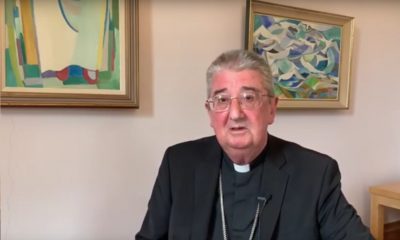
By Cian Molloy - 18 July, 2020
Parishes across the country are starting to grapple with the logistics of ‘clearing the sacramental backlog’, as they plan to organise

Archbishop Diarmuid Martin (Pic Dublin Archdiocese).
Baptism, First Communion, Confirmation and Wedding ceremonies that were indefinitely postponed when the lockdown was declared in March.
There are several primary schools around the country, such as St Laurence O’Toole’s in Roundwood, Co. Wicklow, where pupils were due to make their Confirmation on Friday 13 March, the day after the school’s closure was announced with immediate effect. In these schools, the last thing sixth class did together was take down the unused Confirmation decorations that had been carefully placed in their local parish churches.
As First Communion traditionally takes place in May and June, families had a bit more notice about ceremonies not going ahead – but there are many children around the country who have since outgrown the unused First Communion outfits hanging in their wardrobes.
In the Dublin Archdiocese, priority is being given to the celebration of the Sacrament of Confirmation, issuing memo to priests warning that ‘as the year progresses, it is going to be increasingly difficult to contact families about Confirmation’. A key issue here is that parishes would traditionally communicate with the families of candidates for Confirmation via the local primary school. Contacts with secondary schools would not be as strong – indeed in many rural areas there are no secondary schools in some parishes; additionally even when there is a secondary, some parents choose to send their children to a less-local alternative.
Before the school lockdowns were imposed, Bishop Fintan Gavin of Cork and Ross had already asked teachers to collate all information and data about Confirmation candidates, so that parishes would be able to make contact with those who have registered to receive the sacrament of Confirmation when ceremonies are going ahead, said diocesan communications officer Fr Tom Hayes.
He said that in Cork and Ross some Confirmation ceremonies have already taken place, but remaining ceremonies will be held in September and October when schools have reopened.
In Clogher Diocese, it is planned that Confirmation and First Communion ceremonies will take place between August and October.
In Down and Connor, Confirmation ceremonies started last weekend, said diocesan spokesman Edward McGee and the scheduling of ceremonies is being organised at a local level. He noted, however, that while public worship and religious celebrations have resumed at 72 of the diocese’s parishes, this has yet to happen at 15 parishes, either because some clergy remain cocooned or because the necessary teams of lay volunteers have not been organised.
One issue complicating the scheduling of ceremonies is that after months of lockdown, many families are seizing the first opportunity available to have a holiday, with the note to Dublin priests commenting: “This year, August may become a high point for family holidays and some children, catechists and teachers may not be readily available.”
The Dublin guidance also states: “It will not be possible to hold the traditional large Confirmations for each parish or school. Indeed, with whatever social distancing norms are in place at the time, the numbers who will be able to attend an individual Confirmation ceremony will be reduced and this means that a series of separate ceremonies will have to be planned.”
Fr Diarmuid Hogan, communications officer for the Diocese of Galway, said it was important to remember that arrangements need to be ‘fluid’ to account for any changes in the incidence of the new coronavirus and any changes in government virus containment policies.
“It may be that Confirmations will have to be organised within school time, with a teacher acting as sponsor for every child in the class and no parents present,” he said. It should be noted that such low-key Confirmation ceremonies were relatively commonplace in parts of England 50 years ago, when fathers especially could not get time off work to attend weekday events.
Across the country, the final decision on how to administer the sacraments is being left to parishes. In some dioceses, bishops have indicated that they are delegating their authority to administer Confirmation to all their priests. In Dublin, Archbishop Diarmuid Martin says he will ‘willingly’ grant that authorisation, but he has asked his priests to make a formal application to him, via the Chancellery, before going ahead with a ceremony.
The archbishop also said: “Personally I do not feel that rushing Confirmations just in order to get them done will be the best experience for the children involved. Confirmation is an important milestone in a child’s faith life and it should be an experience the child will remember for life. Preparation events, like Ceremonies of Light or Retreat Days, are important elements in the spiritual formation of candidates and ought not to be simply laid aside this year in order to ‘get confirmations done’.
“In the future, the celebration of Confirmation will be very much the responsibility of each parish and not simply of the school. The current pandemic will be an interesting occasion for us to come to understand exactly the level of responsibility that will be falling on parishes in the future and the need to build up teams of volunteer catechists in each parish.”